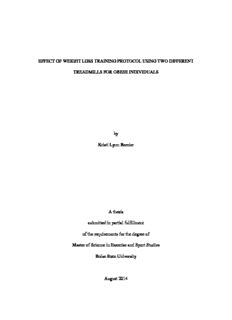Table Of ContentView metadata, citation and similar papers at core.ac.uk brought to you by CORE
provided by Boise State University - ScholarWorks
EFFECT OF WEIGHT LOSS TRAINING PROTOCOL USING TWO DIFFERENT
TREADMILLS FOR OBESE INDIVIDUALS
by
Kristi Lynn Bercier
A thesis
submitted in partial fulfillment
of the requirements for the degree of
Master of Science in Exercise and Sport Studies
Boise State University
August 2014
© 2014
Kristi Lynn Bercier
ALL RIGHTS RESERVED
BOISE STATE UNIVERSITY GRADUATE COLLEGE
DEFENSE COMMITTEE AND FINAL READING APPROVALS
of the thesis submitted by
Kristi Lynn Bercier
Thesis Title: Effect of Weight Loss Training Protocol Using Two Different Treadmills
for Obese Individuals
Date of Final Oral Examination: 02 May 2014
The following individuals read and discussed the thesis submitted by student Kristi Lynn
Bercier, and they evaluated her presentation and response to questions during the final oral
examination. They found that the student passed the final oral examination.
Shawn R. Simonson, Ed.D. Chair, Supervisory Committee
Yong Gao, Ph.D. Member, Supervisory Committee
Jane Shimon, Ed.D. Member, Supervisory Committee
The final reading approval of the thesis was granted by Shawn R. Simonson, Ed.D., Chair of the
Supervisory Committee. The thesis was approved for the Graduate College by John R. Pelton,
Ph.D., Dean of the Graduate College.
ABSTRACT
The AlterG Anti-Gravity Treadmill allows individuals to walk at reduced body
weight by using lower body positive pressure (LBPP). PURPOSE: The purpose of this
study was to discern if the AlterG Anti-Gravity Treadmill was an effective tool to use in a
weight loss walking program with obese individuals when compared to walking on a
traditional treadmill. METHODS: Fifteen male (n = 3) and female (n = 12) obese
participants, aged 18-55 years old with an average body mass index [BMI] ≥ 30 kg/m2),
were randomly assigned to the AlterG treadmill (AlterG; n = 6) and traditional treadmill
(TT; n = 9). Participants followed an 18-week (three 6-week phases) weight loss walking
protocol and exercised 3 days a week. Each 6-week phase increased in intensity and
duration, and by Phase 3 participants were walking at an intensity of 60-85% HRmax for
60 minutes. The participant’s weight, BMI, and body fat percentage (BFP) were recorded
during the program. RESULTS: There was no significant overall weight loss difference
determined between the two groups. The AlterG and the TT group lost an average of 2.33
kg and 2.14 kg, respectively. Similarly, no significant overall differences in BMI and
BFP were found between the two groups. Significant differences were found among the
three phases of the weight loss intervention for weight loss (p = 0.024), BMI reduction (p
= 0.021), and BFP reduction (p < 0.0005). Each group exhibited significant decreases in
weight, BMI, and BFP by the conclusion of the study. CONCLUSION: This study
demonstrated that the walking protocol used with the AlterG Anti-Gravity Treadmill was
iv
effective in producing significant weight loss, decreased BMI, and reduced percent body
fat in obese individuals.
v
TABLE OF CONTENTS
ABSTRACT ............................................................................................................................. iv
LIST OF TABLES .................................................................................................................... x
LIST OF FIGURES ................................................................................................................. xi
CHAPTER ONE: INTRODUCTION ....................................................................................... 1
Obesity .......................................................................................................................... 1
Musculoskeletal Pain and Obesity ................................................................................ 2
Weight Loss Options..................................................................................................... 3
Need for Study .............................................................................................................. 5
Purpose of Study ........................................................................................................... 6
Research Hypothesis ..................................................................................................... 6
Significance of Study .................................................................................................... 7
Study Limitations .......................................................................................................... 7
Operational Definitions ................................................................................................. 7
CHAPTER TWO: LITERATURE REVIEW ........................................................................... 9
Physiological and Musculoskeletal Benefits ................................................................ 9
Exercise Guidelines for Weight Loss ......................................................................... 11
Weight Loss Programs ................................................................................................ 14
Anti-Gravity Exercise ................................................................................................. 17
Conclusion .................................................................................................................. 22
vi
CHAPTER THREE: METHODS AND PROCEDURES ...................................................... 23
Participants .................................................................................................................. 23
Recruitment ..................................................................................................... 23
Randomization ................................................................................................ 24
Orientation Visit.............................................................................................. 24
Equipment and Measurements .................................................................................... 25
Weight Loss Protocol .................................................................................................. 28
Exercise Sessions ............................................................................................ 28
Phase 1: Immediate 1-6 Weeks ................................................................................... 29
Phase Goals ..................................................................................................... 29
AlterG Anti-Gravity Treadmill Exercise ........................................................ 29
Woodway Treadmill Exercise......................................................................... 30
Phase 2: Intermediate 6-12 weeks............................................................................... 31
Phase Goals ..................................................................................................... 31
AlterG Anti-Gravity Treadmill Exercise ........................................................ 31
Woodway Treadmill Exercise......................................................................... 31
Phase 3: Advanced 12-18 Weeks ................................................................................ 32
Phase Goals ..................................................................................................... 32
AlterG Anti-Gravity Treadmill Exercise ........................................................ 32
Woodway Treadmill Exercise......................................................................... 33
Data Analysis .............................................................................................................. 33
CHAPTER FOUR: RESULTS ............................................................................................... 34
Participants .................................................................................................................. 34
vii
Effects of the Walking Intervention ............................................................................ 35
Weight ............................................................................................................. 35
Body Mass Index ............................................................................................ 36
Body Fat Percentage ....................................................................................... 39
Physical Activity Levels ................................................................................. 40
Numeric Pain Scores ....................................................................................... 41
Exercise Adherence ........................................................................................ 42
CHAPTER FIVE: DISCUSSION AND CONCLUSION ...................................................... 43
Discussion ................................................................................................................... 43
Hypothesis 1.................................................................................................... 43
Hypothesis 2.................................................................................................... 45
Hypothesis 3.................................................................................................... 46
Hypothesis 4.................................................................................................... 47
Other Findings ................................................................................................ 48
Limitations .................................................................................................................. 50
Future Applications ..................................................................................................... 51
Conclusions ................................................................................................................. 52
REFERENCES ....................................................................................................................... 54
APPENDIX A ......................................................................................................................... 59
Institutional Review Board Approval Letter............................................................... 59
APPENDIX B ......................................................................................................................... 61
Recruitment Flyer ....................................................................................................... 61
APPENDIX C ......................................................................................................................... 63
viii
Health History Questionnaire Form ............................................................................ 63
APPENDIX D ......................................................................................................................... 66
Informed Consent Form .............................................................................................. 66
APPENDIX E ......................................................................................................................... 71
Numeric Pain Scale Form ........................................................................................... 71
ix
LIST OF TABLES
Table 3.1 Summary of Measurements ...................................................................... 28
Table 4.1 Description of Gender, Age, Height, and Weight ..................................... 34
Table 4.2 Weight and Body Composition Averages by Treadmill Group................ 37
Table 4.3 Average Step Count Level by Treadmill Group ....................................... 41
Table 4.4 Number of Sessions Completed and Percentages by Treadmill Group .... 42
x
Description:musculoskeletal benefits of exercise, effects of exercise on weight loss, as well as the benefits and significance of anti-gravity exercise. Studies were included in the literature review if they discussed either weight loss programs or antigravity exercise for weight loss or rehabilitative purpose

